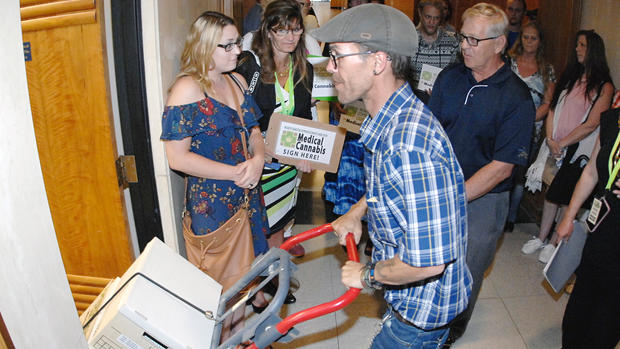The Initiated Measure Process Has Not Served North Dakota Well

Brandon Muhs, front, of Fargo, North Dakota, pushes a dolly cart with boxes containing petition signatures into the Secretary of State's office on 7-11-2016 for a medical marijuana initiative for consideration on the November ballot. Initiative committee chairman Rilie Ray Morgan, second from right, and his wife, Rita, far right, also of Fargo, were among a group of supporters gathering at the state Capitol in Bismarck, North Dakota.
Today the Bismarck Tribune editorializes against a push by lawmakers a bill creating a commission tasked with reviewing our state’s initiated measure process (it passed in the state Senate this week),
“The initiated measure process has served North Dakota well and the Legislature should tread lightly when considering changing it,” the paper writes.
Only, that’s not true. The initiated measure process has not served North Dakota well, and the 2016 election cycle is proof positive of its deep and myriad flaws.
Take Measure 5 on the 2016 ballot, for instance. It was sold to voters as a legalization of medical marijuana, only that’s exactly what it wasn’t. Despite all the chest thumping from the proponents of ballot box legislating about the wisdom of the electorate, Measure 5 managed to get nearly 64 percent of the vote from people who thought they were decriminalizing medical marijuana without language that actually, you know, decriminalizes medical marijuana.
“The process gives the people a direct voice in government,” the Tribune writes, as though the virtues of direct democracy are self evidently true. Only, the American system of government was created to embrace the “consent of the governed” while simultaneously protecting against what James Witherspoon, a signatory to the Declaration of Independence, called the “caprice and the madness of popular rage.”
Most of our nation’s founders – including luminaries like James Madison and Alexander Hamilton, two authors of the Federalist Papers – were very much against direct democracy. They were rightly worried that the popular electorate is too easily manipulated into making rash and emotional decisions.
Rash decisions like voting for a constitutional amendment promoting supposed “victims rights” which directly undermine the rights of the accused.
That was Marsy’s Law, Measure 3 the November 2016 ballot, which was backed by a lavishly funded campaign bankrolled by an eccentric California billionaire. Our state’s legal community was almost unanimous in its opposition to Marsy’s Law, but their voices didn’t count. What carried the day were emotionally manipulative television ads and a celebrity endorsement.
[mks_pullquote align=”right” width=”300″ size=”24″ bg_color=”#ffffff” txt_color=”#000000″]Our state’s legal community was almost unanimous in its opposition to Marsy’s Law, but their voices didn’t count. What carried the day were emotionally manipulative television ads and a celebrity endorsement.[/mks_pullquote]
Now that Marsy’s Law is in our has created a mess in our state’s criminal justice system.
But that’s just the will of the people or something.
“It takes time, work and money to get a measure before the voters,” the Tribune writes. “It’s not simple or easy.”
Only that’s not true. If you’ve got deep pockets it’s very easy to hire some temp workers to get the signatures you need to put your issue before voters. And since the electorate is easily manipulated with slick advertising campaigns, those deep pockets can usually win on the ballot too.
If I had my way I would rid our state of the initiated measure process. While it’s right and appropriate that voters might veto a given piece of policy through the referendum process, voting en masse on lengthy policy proposals is a poor way to make law.
But because so many in our society have a fetish for direct democracy the process isn’t likely to go anywhere. But maybe we can at least make some tweaks.
That’s what the legislation in Bismarck is aimed at. Not eliminating the initiated measure process but perhaps putting in place some protections from the whims of the lightly informed mob.
One change which might be worthy of discussion is limiting initiated measures to broad policy questions. The voters aren’t going to read pages and pages of legal language to make up their minds about a ballot measure. But asking them a question – such as “Should medical marijuana be legal” – and then relying on lawmakers to implement the answers to those questions as policy would be a better way to go about things.




